History
 Legendary former Golden Lions coach Pieter Andries (PA) Pelser has passed away at the age of 89.
Legendary former Golden Lions coach Pieter Andries (PA) Pelser has passed away at the age of 89.

 Martiens Louw and Robbie Barnard, hooker and prop, who played together for Transvaal and South Africa, have died just over a week apart.
Martiens Louw and Robbie Barnard, hooker and prop, who played together for Transvaal and South Africa, have died just over a week apart.
Louw died in Pretoria on 12 October 2013 and Barnard on 20 October 2013. Louw was 75, Barnard 71.
 Australians are today mourning the death of a legend.
Australians are today mourning the death of a legend.
Edward Heinrich, who is considered a classic Wallaby, has passed away last night at the age of 73.
Some Great pictures of big moments in South African Rugby
 The Blue Bulls Rugby Union and Blue Bulls Company are saddened by the news that Professor Fritz Eloff passed away on Thursday, September 5th, 2013. The BBRU and BBC extend condolences to his family and wish them strength during this difficult time.
The Blue Bulls Rugby Union and Blue Bulls Company are saddened by the news that Professor Fritz Eloff passed away on Thursday, September 5th, 2013. The BBRU and BBC extend condolences to his family and wish them strength during this difficult time.
He leaves behind two daughters and two grandchildren.
 Former Wales and British and Irish Lions flyhalf Cliff Morgan has died at the age of 83, the Welsh Rugby Union announced on Thursday.
Former Wales and British and Irish Lions flyhalf Cliff Morgan has died at the age of 83, the Welsh Rugby Union announced on Thursday.
 South Africa 17 / 6 Bay of plenty-Thames Valley-Counties
South Africa 17 / 6 Bay of plenty-Thames Valley-Counties
It was the last midweek match of the tour with only the 4th test remaining. The opposition was a combination of 3 relatively weak sides namely Bay of Plenty (who won only 1 of 5 matches played in the 1956 season); Thames Valley (who won only 3 of 8) and Counties (a team founded as South Auckland in 1926 and who won only 2 of 13 season games in 1956). These three teams combined for the first time in 1956 and played 2 warm-up games namely against Auckland (7th of August 1956 losing 6-7) and Waikato (11th of August 1956 losing 6-24) in preparation for the Springboks.
 It was the Springboks’ best performance of the tour. A real confidence booster after the shock defeat against the University side but at the same time a game that had a negative impact in more than one way. It showed New Zealand the danger of allowing the Springboks space to play the Craven-linking pattern. Not that New Zealand was unaware of the Springbok style but it re-affirmed the necessity of keeping the Springboks on the back foot.
It was the Springboks’ best performance of the tour. A real confidence booster after the shock defeat against the University side but at the same time a game that had a negative impact in more than one way. It showed New Zealand the danger of allowing the Springboks space to play the Craven-linking pattern. Not that New Zealand was unaware of the Springbok style but it re-affirmed the necessity of keeping the Springboks on the back foot.
 The Western Province Rugby Football Union (WPRFU) have announced that will be raising funds for former player, Tinus Linee at next week’s Super Rugby match between the Stormers and the Reds at Newlands.
The Western Province Rugby Football Union (WPRFU) have announced that will be raising funds for former player, Tinus Linee at next week’s Super Rugby match between the Stormers and the Reds at Newlands.
 Former Springbok Tinus Linee has been diagnosed with the same disease suffered by former Springbok Joost van der Westhuizen, it was reported on Tuesday.
Former Springbok Tinus Linee has been diagnosed with the same disease suffered by former Springbok Joost van der Westhuizen, it was reported on Tuesday.
 Noticeably, conversation about the 1956 tour always detour to the match against the New Zealand Universities. Historically, it was the first time a New Zealand University team played against an international touring side but this match is synonymous with the 1956 tour for other reasons. The fact that the Universities team won is also not really the main reason why Kiwi’s still rate this match as the best match of the tour. It was the manner in which the Universities team won that delighted the New Zealand rugby fraternity. All the good football came from the home side. The backs demonstrated opportunism, sensible anticipation and application while the pack totally dominated proceedings. The game is nevertheless mostly remembered as the game of the great Ron Jardon ‘try-that-wasn’t’. A great howl went up in protest when Jardon was called back after a spectacular 65 meter run through almost the entire Springbok team (listen to Winston McCarthy highlights of the match here) and old-timers almost without exception still mention the Jardon try to this day whenever the 1956 tour are under discussion.
Noticeably, conversation about the 1956 tour always detour to the match against the New Zealand Universities. Historically, it was the first time a New Zealand University team played against an international touring side but this match is synonymous with the 1956 tour for other reasons. The fact that the Universities team won is also not really the main reason why Kiwi’s still rate this match as the best match of the tour. It was the manner in which the Universities team won that delighted the New Zealand rugby fraternity. All the good football came from the home side. The backs demonstrated opportunism, sensible anticipation and application while the pack totally dominated proceedings. The game is nevertheless mostly remembered as the game of the great Ron Jardon ‘try-that-wasn’t’. A great howl went up in protest when Jardon was called back after a spectacular 65 meter run through almost the entire Springbok team (listen to Winston McCarthy highlights of the match here) and old-timers almost without exception still mention the Jardon try to this day whenever the 1956 tour are under discussion.
 After the trails for the selection of a Springbok side to tour the United Kingdom in 1931 the general feeling among selectors was that another equally strong Springboks side could easily be selected. That is a second Springbok team of almost equal ability that could potentially challenge if not beat the side that was selected to tour.
After the trails for the selection of a Springbok side to tour the United Kingdom in 1931 the general feeling among selectors was that another equally strong Springboks side could easily be selected. That is a second Springbok team of almost equal ability that could potentially challenge if not beat the side that was selected to tour.
A tour was consequently arranged for these unlucky players to Argentina and the team was officially called the Gazelle. This tour took place in 1932 under the management of Paul Roos and the captaincy of Joe Nykamp. The side consisting of uncapped players wore blue shirts emblazoned with springbok head, red stockings and white shorts. They played eight matches; won all of them and scored 269 points with only 24 points scored against them. The two matches against a representative Argentinian side the Gazelles won 42-0 and 34-3 respectively. Gimnasia y Esgrima, a club coached and captained by B.H Heatlie gave the South African Gazelles stern opposition and lost by only 11-5 in the last game of the tour. Heatlie was the man who captained South Africa in their first ever international against a British touring side.
 We take a look at Springbok participation in the Tri-Nations (now expanded and renamed The Rugby Championship).
We take a look at Springbok participation in the Tri-Nations (now expanded and renamed The Rugby Championship).
The Springboks took part in the Southern Hemisphere’s premier international competition just five years after being readmitted to international competition in the 90’s.
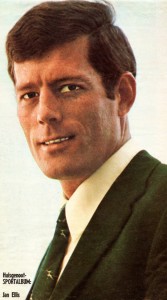 With the news this week that Springbok great, Jan Ellis, passed away at the age of 71, I just had to write this tribute to Jan.
With the news this week that Springbok great, Jan Ellis, passed away at the age of 71, I just had to write this tribute to Jan.
Jan Ellis personifies Springbok rugby for me. It has been said that as humans we think in pictures. When we think of something we see a picture of some sorts and this picture can differ from one person to the next, which is why we sometimes voice the same words but come up with different understanding or meaning. The best communicators are those who can create clear and vivid pictures in the mind of his listeners.
When I think of Springbok rugby I see Jan Ellis. Hard, uncompromising, fast with a touch of artistic moodiness and flair but with relentless motivation to succeed based on a staunch work ethic and absolute conviction of what is right and wrong – that is Jan Ellis in a nutshell, for me.
So, I don’t see all that, I just see pictures of Jan Ellis flashing through my mind.
(see the photo gallery I’ve created of Jan Ellis here).
The analogy between the Springboks and Jan Ellis, for me, came along probably because I had so many pictures of Jan Ellis when I started with my sampling of rugby pictures in 1970. I was born in Windhoek, South West Africa (now Namibia) and Jan was SWA’s second Springbok, the first being Sias Swart.
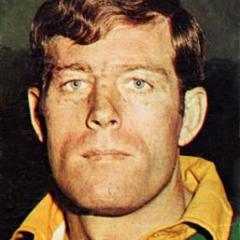 The South African Rugby Union on Friday expressed its deep sadness at the passing of legendary former Springbok looseforward, Jan Ellis.
The South African Rugby Union on Friday expressed its deep sadness at the passing of legendary former Springbok looseforward, Jan Ellis.
The one-time joint record holder for the number of Springbok caps succumbed to cancer at a hospice in Pretoria after suffering from the disease for some time. He celebrated his 71st birthday in January.
 The 1974 Tour of the Lions to South Africa was undoubtedly the most unsettling tour ever for Springbok rugby. Touring unbeaten through South Africa superior in every aspect in virtually every single match including the test matches it was a massive wake-up call for South African rugby.
The 1974 Tour of the Lions to South Africa was undoubtedly the most unsettling tour ever for Springbok rugby. Touring unbeaten through South Africa superior in every aspect in virtually every single match including the test matches it was a massive wake-up call for South African rugby.
I was 12 years old when this tour eventuated. In my mind at that time the Springboks had an aura of invincibility. I was too young to know about the 1956 and 1965 tours as the patriotic Afrikaans media did not write much about it. The country was still in euphoria after the 1970 victory over Lochore’s All Blacks and the unbeaten 1971 tour to Australia. It was never said in so many words but generally the 1972 loss against England was seen as just a hiccup; a fleeting glitch due to team selections and underestimation of the opposition.
 Doctor Louis Luyt, a big man and bigger figure in Rugby Circles in South African Rugby, passed away ealier today, 1 February 2013.
Doctor Louis Luyt, a big man and bigger figure in Rugby Circles in South African Rugby, passed away ealier today, 1 February 2013.
 First match: 15 May 1956 – Canberra
First match: 15 May 1956 – Canberra
South Africa 41 / Australian Capital Territory (ACT) 6
Promoting rugby union was paramount in Australia when the Springboks arrived in 1956. Consequently -soon after arrival- at a civic reception at the Sydney Town Hall Danie Craven and Basie Viviers promised to play open attractive rugby to help rugby union in their battle for player volume against rugby league.
The team travelled to Canberra for the first match against an Australian Capital Territory team. This match was not part of the original tour itinerary and was arranged as a tribute to the resolute efforts of local administrators to gain footing for union rugby in an area with a population basis slightly bigger than Paarl in Cape Province, South Africa.
 Former Australia coach Bob Dwyer was recovering in hospital Thursday after suffering a heart attack, the Australian Rugby Union said.
Former Australia coach Bob Dwyer was recovering in hospital Thursday after suffering a heart attack, the Australian Rugby Union said.
 Morne van der Merwe, ex WP and Stormers prop, has only days to live.
Morne van der Merwe, ex WP and Stormers prop, has only days to live.
He was diagnosed with a brain tumor two years ago and his wife, Cindy, is hurriedly putting together mementoes of his life to keep for the couple.s two young boys.
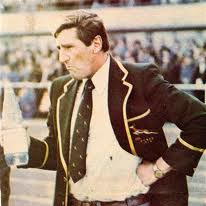 Ian Kirkpatrick, great rugby man, died suddenly at his home in Helderberg Village on Sunday. He was 82. His influence on South African rugby over six decades cannot be overestimated.
Ian Kirkpatrick, great rugby man, died suddenly at his home in Helderberg Village on Sunday. He was 82. His influence on South African rugby over six decades cannot be overestimated.
On Friday he complained of a ‘stomach upset’ and cancelled a meeting with an overseas company about to make a documentary on the 1974 tour, when Kirkpatrick was a national selector.
His playing career was great. He left Kimberley Boys’ high and at the age of 19 and played for Griquas. The next year he went to the Springbok trials at Newlands when the great Springbok team was chosen for the 1951-52 tour. In 1953 he made his Springbok debut against the Wallabies at Newlands, playing flyhalf.
Kirkie played for South Africa in 13 Tests. Of the 13 two were lost, and on each occasion it was at Newlands (against Australia and France) and he was at flyhalf. In 10 Tests he was at centre in partnership with John Gainsford.
Third Test – Lancaster Park, Christchurch, 18 August 1956
New Zealand 17 / South Africa 10
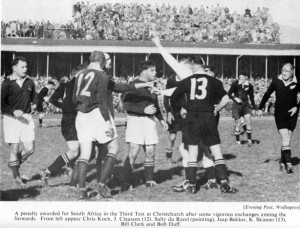 Skinner: “From what I’ve read over the years you’d have thought the fighting in that third test lasted the entire game, but that simply wasn’t true. There were only two punches – one that floored Koch and the one that stopped Bekker.”
Skinner: “From what I’ve read over the years you’d have thought the fighting in that third test lasted the entire game, but that simply wasn’t true. There were only two punches – one that floored Koch and the one that stopped Bekker.”
Don Clarke: “Kevin Skinner is quite a modest man but I saw his knuckles after the match.”
Taranaki 3 / 3 South Africa – 11 August 1956, Rugby Park New Plymouth
 The Springbok team arrived in New Plymouth in high spirits after winning the second test and constructing an impressive win against Wanganui – scoring 7 splendid tries. There was a feeling in the camp that the tour was back on track and that the team was starting to hit form. The struggling performance against a spirited Taranaki team therefore came as a bit of a shock; a reality check.
The Springbok team arrived in New Plymouth in high spirits after winning the second test and constructing an impressive win against Wanganui – scoring 7 splendid tries. There was a feeling in the camp that the tour was back on track and that the team was starting to hit form. The struggling performance against a spirited Taranaki team therefore came as a bit of a shock; a reality check.
Within context of the tour it was a match as important and influential as the Waikato game. The spirit, commitment and overall performance of the Taranaki team showed the way for the All Blacks according to Terry McLean and this had a highly significant influence on the outcome of not only the third test but also the series:
 Six months ago Chris Paterson announced his retirement from International rugby after 109 International caps but now he’s gone a step further and announced his overall retirement from the game, his last game to be played this weekend.
Six months ago Chris Paterson announced his retirement from International rugby after 109 International caps but now he’s gone a step further and announced his overall retirement from the game, his last game to be played this weekend.
 I try not to copy and paste articles, but this one cannot be reworked.
I try not to copy and paste articles, but this one cannot be reworked.

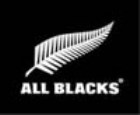 There are a host of international teams like Scotland and Ireland not even to mention second tier test nations like Canada, USA, Italia and Argentina who have never beaten the All Blacks.
There are a host of international teams like Scotland and Ireland not even to mention second tier test nations like Canada, USA, Italia and Argentina who have never beaten the All Blacks.
Wales have beaten the All Blacks only three times, the last time being in 1953. In general the only teams really able to foster some occasional wins against the All Blacks are England, France, Australia and South Africa with the latter being by far the most successful in this regard.
The fact that Rhodesia (now of course Zimbabwe) have once beaten the All Blacks are therefore something really unique and says a lot about the state of rugby in Southern Africa at the time this occurred namely in 1949. The fact that South Africa also white washed the 1949 All Blacks 4-0 in the test series leaves the impression that it was a weak All Black side which is something most rugby scribes strongly reject.
 Former Wallaby flyhalf Michael Lynagh is reported to have suffered a stroke, according to Australian radio.
Former Wallaby flyhalf Michael Lynagh is reported to have suffered a stroke, according to Australian radio.
 This weekend that was I went to a coaching course with a group of players. The course was generally speaking very informative. We rotated through different stations doing basic handling, rucking, tackling and kicking drills with lots of feedback to players and coaches.
This weekend that was I went to a coaching course with a group of players. The course was generally speaking very informative. We rotated through different stations doing basic handling, rucking, tackling and kicking drills with lots of feedback to players and coaches.
At the end we played a game (10 players on each side) called touch and ruck. It is a really nice way to enforce some basic skills at the young age groups. Players learn about maintaining the offside line, to go up in a line on defence and on attack, to touch with both hands (essential to learn that you need to punch through with the arms when you tackle), to rip and place and to clean-out at the rucks.
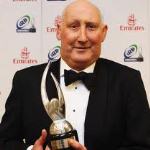 Michael “Jock” Hobbs, a leading figure in New Zealand rugby who helped secure his country’s bid to host last year’s World Cup, died aged 52 on Tuesday after a long battle with cancer, his family said. Continue reading
Michael “Jock” Hobbs, a leading figure in New Zealand rugby who helped secure his country’s bid to host last year’s World Cup, died aged 52 on Tuesday after a long battle with cancer, his family said. Continue reading  2 August 1956, Solway Ground, Masterton: South Arica 19 / Wairarapa-Bush 8
2 August 1956, Solway Ground, Masterton: South Arica 19 / Wairarapa-Bush 8
It was another disappointing Springbok performance and although they won by 11 points all the tries came from individual effort rather than from smooth team work as one would expect after 7 weeks and 15 matches on tour (excluding the 3 weeks and 6 matches in Australia).
 28 July 1956 – Rugby Park, Invercargill
28 July 1956 – Rugby Park, Invercargill
South Africa 23 / Southland 12
Southland hospitality was at play when the Springboks arrived in a cold Invercargill. Lavish entertainment including flights to the beauty spots in the South Island was laid out by the Southland Rugby Union.
17 July 1971 – Sydney Oval, Sydney

 South Africa 19 / Australia 11
South Africa 19 / Australia 11
Not much is available about this Test apart from some Gerhard Viviers commentary (see video below) and brief descriptions of the Springbok tries. There were two changes to the South African team who played against France earlier the season at home.
Morné du Plessis and Hannes Viljoen got their first caps in the places of the injured Tommy Bedford and Gert Muller. The South African team can be seen in the table below.
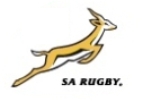 South Africa 27 /West Coast-Buller 6
South Africa 27 /West Coast-Buller 6
Dominating in the scrums and line-outs has so far proven to be not enough for the 1956 Springbok team. Not even halfway thought the tour yet and they’ve already lost two tour matches namely against Waikato and Canterbury as well as the first test in spite of winning the line-out and scrums contests in each of these matches.
The two main problems seem to have been; firstly, an inability to contest at the rucks/tackle ball; secondly, lack of polish in the backline. The lack of structure at the rucks and collision areas has been the main area targeted by the local team’s right from the Waikato match. The primary approach was simply to change the line-outs and scrums into rucks and then to charge through in numbers and/or to put the ball behind the Springboks with box kicks and then charge at the backs.
Canterbury 9 / South Africa 6
This match was a turning point in terms of the media and public’s (in both countries) relationship with Craven and the 1956 Springbok team.
Terry McLean writes: This was the day that Canterbury, for the second time in three encounters, defeated South Africa, this was the night that Danie Craven, after telling me that he was not a happy man, said a critical piece about refereeing in New Zealand, this was the week-end in which he made an official complaint about the quality of New Zealand refereeing and this was the succeeding week in which angry passions were stirred in the backrooms of newspaper offices, both South African and New Zealand, that the Grey River Argus felt impelled to say, “Sour grapes, Dr Craven –very sour grapes indeed!”
The 1956 team was not a particularly happy touring group and struggled to find their feet right from the start of the New Zealand leg of the tour after losing the first match against Waikato. The Springboks had a hard time adjusting to the wet playing surfaces, the rainy/muddy conditions, the flat lying and rush-up defensive style of the New Zealand teams but in particularly with the kick and charge/marauding foot rush tactics of the New Zealand teams. The rucks were a nightmare for the Springboks and they were at loss how to counter the locals’ aggression, structure and ascendency at the tackle ball.